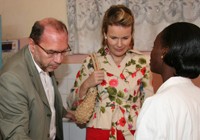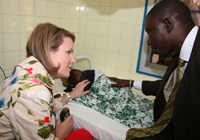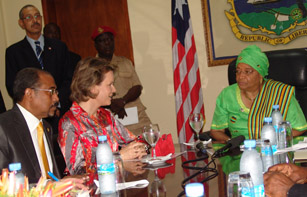
At the Centre de Santé Roi Baudouin, Dr Piot and Princess Mathilde met with staff who shared an overview of the health centre’s services. Dakar, 6 December 2008.
Credit: UNAIDS/Jacky D. Ly
While in Senegal attending ICASA 2008, UNAIDS Executive Director Dr Peter Piot and UNAIDS and UNICEF Special Representative HRH Princess Mathilde of Belgium spent 6 December learning firsthand the successes and challenges faced in Dakar in providing HIV prevention and treatment services, in particular for women, children and young people.
In partnership with UNICEF, the Government of Belgium, and UNAIDS’ regional office for West and Central Africa and its Senegal office, UNAIDS and UNICEF jointly visited health centres supported by UNICEF where they met with health officials, medical practitioners, community mobilizers, and people living with HIV.
Centre de Santé Roi Baudouin

Located in Guédiawaye, on the outskirts of Dakar, this district centre is a main provider of gynaecology, obstetric, and paediatric services, and receives support on maternal and child health from UNICEF.
Credit: UNAIDS/Jacky D. Ly
At the Centre de Santé Roi Baudouin, Dr Piot and Princess Mathilde met with staff who shared an overview of the health centre’s services and chatted with patients and their families. Located in Guédiawaye, on the outskirts of Dakar, this district centre is a main provider of gynaecology, obstetric, and paediatric services, and receives support on maternal and child health from UNICEF. It also provides antiretroviral treatment for more than 300 people living with HIV. Voluntary counselling and testing services are offered as well as services for the prevention of mother-to-child transmission of HIV. With tuberculosis a leading cause of death for people living with HIV in sub-Saharan Africa, the Roi Baudouin centre provides treatment to address TB/HIV co-infection.
Centre Conseil pour Adolescents – an open environment
The second visit of Dr Piot and Princess Mathilde was to the nearby Centre Conseil pour Adolescents (CCA). The CCA serves as an important access point to reach out to young people with a range of HIV prevention, care and support services. The centre has a working relationship with the health centre ensuring that young people who are in need of treatment have access to it.
The CCA provides treatment for other sexually transmitted infections. As a drop-in youth centre with a strong recreational component, the CCA is an open environment where young people feel comfortable getting information about sex and reproductive health without fearing stigma or judgement. The CCA in Guédiawaye was the first of its kind in Senegal and there are now 13 others like it throughout the country.
Self-sufficiency
Dr Piot and Princess Mathilde ended their joint UNAIDS and UNICEF visit at the Centre Régional du Recherche de Formation within the Centre Hospitalier Universitaire de Fann – a research and training institution that has a long tradition in the country. Since 2007, the centre has provided HIV treatment to more than 3,500 people in need.
Self-sufficiency is a distinguishing feature of the centre. It has a vegetable garden where fresh food is grown to help boost patients’ nutritional needs. Through its national, regional and international networks, the centre shares and receives information regarding HIV and other sexually transmitted infections. Dr Piot and Princess Mathilde were briefed on an upcoming virtual health library project hopes to expand on-line to reach more people.







 At the Centre de Santé Roi Baudouin, Dr Piot and Princess Mathilde met with staff who shared an overview of the health centre’s services. Dakar, 6 December 2008.
At the Centre de Santé Roi Baudouin, Dr Piot and Princess Mathilde met with staff who shared an overview of the health centre’s services. Dakar, 6 December 2008. 




